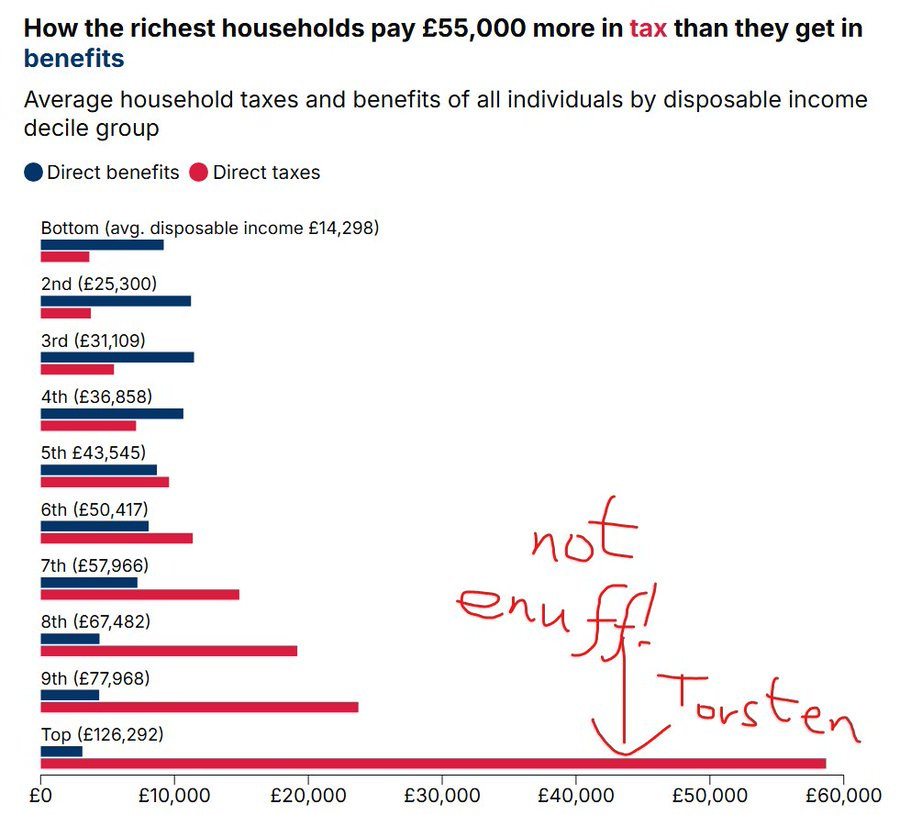Is Torsten Bell an idiot?
Nassim Taleb explained how certain institutions encourage, promote and reward articulate, capable people for behaving like complete fools.
According to this rather glowing Sunday Times article (paywalled) Torsten Bell, former CEO of the Resolution Foundation, is an “economic mastermind”.
Elsewhere, he tetchily informed Sky News that “I’m not an idiot”. Why was that necessary?
Honest people don’t say “Trust me”, they keep promises, turn up on time, take responsibility and build reputation .
Likewise wise people, “economic masterminds”, don’t declare themselves “not an idiot”, they just become recognised for their judgment, nuance and integrity.
What’s going on?
Bell’s backstory: not an idiot
From his wikipedia page, Bell’s parents were “an author and policy analyst specialising in family policy” and “a charity executive”. Our favourite Education Secretary is determined to break links between parents and children between childhood background and adult future; perhaps it would be churlish to wonder if a bit more entrepreneurship, wealth creation, or simple private-sector hard work in his immediate heritage could have given our hero some different biases.
Young Bell studied at a grammar school in Kent (naturally, no privilege there) and went on to PPE at Oxford. At a young age, our hero was clearly a smart cookie. He’s not an “idiot” in the sense of someone with severe learning difficulties who might have been the butt of unkind jokes. Obviously, he’s articulate, numerate, engaging and smart.
PUS for Pensions
Coverage of his most recent Treasury appointment to write the Budget, because Reeves can’t, has been pretty savage. Here’s a few takes, the first from DCI (retired) Burnside on X. No country has ever had a growing economy with world-class public services and a generous welfare state paid-for entirely by “the rich”; the Scandinavian economies that some British progressives adore feature much higher taxes on lower and middle earners.
On a related note, here’s him sharing some (quite good, to be fair) walking snaps. The responses are spot on. The Resolution Foundation has never seen a tax it doesn’t like. I suspect Bell’s answer, if asked, to a Laffer-derived question like “what would be the best rate of a tax on work/capital/land” is always going to be “more”.
Finally, here’s how he might react to the distribution of tax contributions by income decile. Yes Torsten, they have “broad shoulders”, but (in your blind spot) they’re already carrying a paving slab, some tools, and a dishwasher. Atlas had broad shoulders too, and (according to Ayn Rand) he shrugged.
So how can we square this? Is Torsten Bell an idiot? The answer lies in this key excerpt here on Medium. It’s an easy 5-minute read, so I won’t detract by paraphrasing. It’s from Nassim Taleb’s book Skin in the Game.
Torsten is Intelligent Yet Idiot.
Here’s my take on Torsten, informed by Nassim Taleb.
He’s very bright, he’s definitely good at excel, he’s good at exams. He’s at his best surrounded by slightly woollier socialists, who love it when he gives them a veneer of rigour. He’s photogenic, he’s decently-dressed. He’d be the stand-out star of an audit firm’s graduate scheme. He’s probably quite “nice” in the sense that if you found yourself next to him at your kids’ sports fixture, he’d make pleasant conversation as long as you didn’t get onto how much tax he wants you to pay.
He has no experience of the private sector; he has made no effort even to gain contact with the private sector. It’s a complete blind spot. Worse, he doesn’t understand what he might learn if he did get some exposure to the private sector, and worse still, he doesn’t even conceive that such a blind spot might exist. He is so comfortable in places where his biases are feted, that he forgets entirely to consider that he has biases at all. That’s why his conduct, as well as his intellectual framework, is increasingly vulnerable and thin-skinned.
This is what Nassim Taleb’s telling us, in both Skin in the Game, and in Black Swan. In the latter, he tells you of a visit to Umberto Eco’s vast library or “anti-library”, where the point isn’t (as most visitors assume) that the owner has read (or, worse, purports to have read) all the books. The point is to serve both as a tool and, more abstractly, as a reminder of how little you know.
So this tendency to offend Eco’s library sensibility by focusing on the known is a human bias that extends to our mental operations. People don’t walk around with anti-résumés telling you what they have not studied or experienced (it’s the job of their competitors to do that), but it would be nice if they did.
The problem isn’t that people of fundamentally intelligent capability have blind spots. Humans have blind spots. The problems are, first, they lose touch with the possibility that blind spots might exist and, second, they are attracted to places and institutions where their intelligence is celebrated while their idiocy is never challenged. Finally, third, their financial/reputational advancement is positively enhanced by remaining blind - if they had skin in the game, they’d have an incentive to explore those blind spots.
That’s why the UK is suffering from full-throttle socialism. Our institutions have persuaded themselves it will work differently, this time, somehow. It’s easy to persuade yourself of that if you’re not only unaware of your private sector blind spot, but you also can’t even conceive that it exists.







In other words he doesn’t know what he doesn’t know. Very dangerous.
He is an idiot. He's like Joseph Heller's character Scheisskopf, who companies hired when they wanted to write off losses on purpose - i.e. he would unwittingly run things into the ground, but his employers knew that and tasked him with that so they could avoid punitive taxation. Ironic?